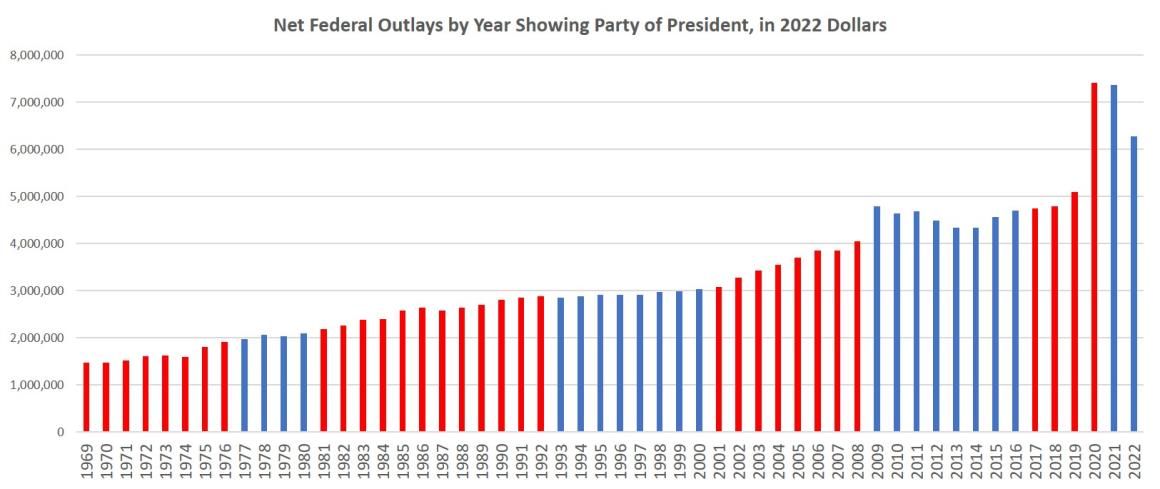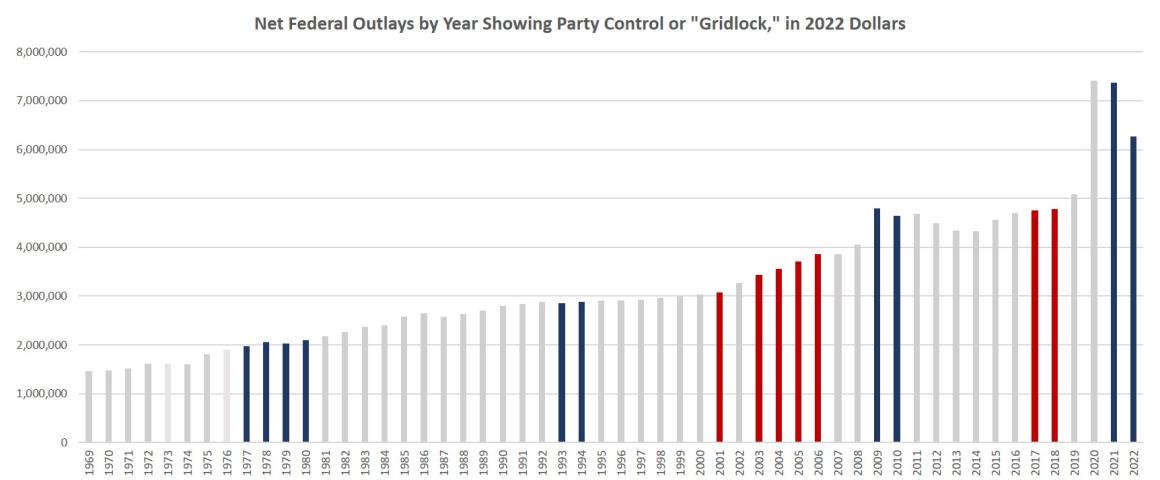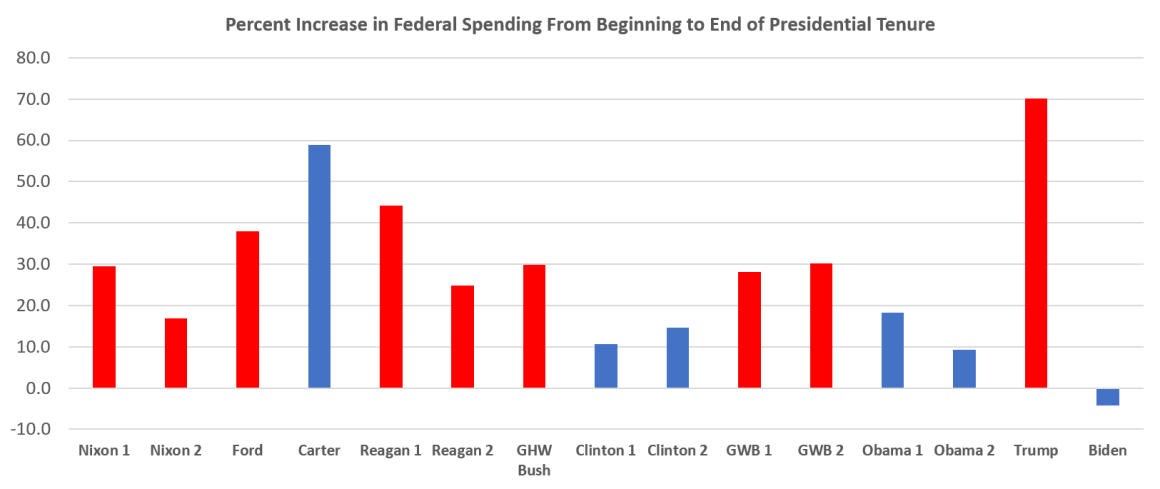After countless predictions of economic armaggeddon and panicky entreaties to raise the debt ceiling with no strings attached, the Biden White House and Congressional Republicans agreed on a new budget deal this week that does virtually nothing at all to change the status quo. The deal in no way returns federal spending to pre-covid levels. At best, the deal does "limit" spending by placing tentative caps on spending which—assuming they are not abandoned in the face of some new economic or geopolitical "emergency"—allow for a one-percent increase in spending each year over the next two years. At the same time, however, the deal abolishes the debt ceiling altogether until 2025. As summarized by the Associated Press:
The agreement would keep nondefense spending roughly flat in the 2024 fiscal year and increase it by 1% the following year, as well as suspend the debt limit until January 2025 — past the next presidential election.
And, according to NBC news:
The agreement includes spending caps for the next two years to set up the appropriations process. In fiscal year 2024, it would limit military spending to $886 billion and nonmilitary discretionary spending to $704 billion. In fiscal year 2025, those numbers would rise to about $895 billion and $711 billion.
What all this really means is that discretionary spending (which is generally around $2 trillion in miscellaneous and military spending) will continue upward without even a meaningful pause. Meanwhile, mandatory spending—such as Social Security, Medicare, and Medicaid is in no danger of actually going down. At a minimum we can expect annual increases of $60 billion or more each year in the near future. That's the most "thrifty" scenario. After all, it's only a matter of time until there's a recession and thus a need for "stimulus" and bailouts. Or, Washington may decide the US needs another full-blown war. At that point, all bets are off when it comes to spending.
This miniscule "cut" in spending is more or less what we here at mises.org predicted would happen. There was never any doubt that the debt ceiling would be raised yet again, and of course, there would be no real cuts to overall federal spending. This is what has happened. Moreover, total spending remains more than a trillion dollars above where it was in 2019, even after the Trump administration was racking up near-trillion-dollar deficits.
Unfortunately, some rather naïve observers thought the Republican negotiators would somehow manage to force big concessions in federal spending or regulation. That didn't happen, and no one who has been paying attention to the GOP since the days of Calvin Coolidge would expect otherwise.
Contrary to the still-enduring myth about Republican budget cutting, there is no correlation whatsoever between Republican control of DC and the trajectory of federal spending. If we look at Republican control of the White House, for example, we see that federal spending often accelerates during the tenures of GOP presidents, especially George W. Bush and Donald Trump. (Red years are GOP, and blue years are Democrat presidents):
Keep in mind also, that these are inflation-adjusted numbers, so nominal increases were all larger. Some might protest that the GOP deserves no blame here because these presidents—despite holding the veto pen—are somehow forced into signing off on runaway spending.
Well, if we look at periods when the GOP had total control of the White House and the Congress, we still find zero evidence of a reluctance to spend big taxpayer bucks on the part of the GOP. (Gray years are divided government):
This graph even understates Republican spending in some cases. In the case of 2009, for example, it must be remembered that lame-duck George W. Bush was enthusiastically in favor of the huge bailouts and federal stimulus programs that launched 2009's federal spending well above the established trend. That was hardly Obama's idea. Nor is that a surprise since in multiple years of total GOP control under Bush, Republicans expanded spending with new Medicare programs, "no child left behind," and a cascade of federal dollars spent on the Pentagon and "homeland security." Moreover, the GOP offered essentially zero resistance to Trump's $2-trillion-dollar spending spree in reaction to the covid panic of 2020. Those who did oppose endless spending were loudly attacked by Trump.
Now, in spite of this deal, and the covid "emergency" being officially over, total spending remains well over a trillion dollars above the already bloated 2019 total.
Moreover, if we compare federal spending in the last year of each presidential term, compared with the outgoing budget of the preceding presidential term, we find that the biggest big spender was Donald Trump, followed by Carter, Reagan (first term), and Ford. Again, there's no reason here to place any hope in the GOP when it comes to fighting against growing spending.
Unfortunately, given the state of the American public, we should not expect anything else.
Even if GOP members of Congress genuinely wanted to cut spending, they would only be punished by the voters for doing so. 71 percent of conservatives polled say they want the government to spend more money on the military. This on a military that is three times more expensive than the next most expensive military (China), and which now is well on its way to receiving more than a trillion dollars per year.
Only small minorities within the public actually want the federal government to spend less on programs ranging from education to Social Security to poverty relief. Yes, a recent poll suggest that "Six in 10 U.S. adults say the government spends too much money." But when respondents are asked to get more specific, it turns out they actually want more spending. It's just they want more spending on things they like, and less spending on things they don't like.
This is why members of Congress rarely get voted out of office for spending "too much" federal money. Rather, they are more likely to be punished for spending federal money on the wrong things. Consequently, there is no rush in Washington to cut the total amount of federal spending. What really matters is funneling money to each elected officials' favored interest groups, whether they be pensioners, weapons contractors, or some of the 42 million Americans on food stamps. Whether Republican or Democrat, there simply isn't much to be gained from going to wall to cut spending. Certainly, a handful of members of Congress with atypical constituents can do this. The average voter, however, is quite happy to see more government spending, so long as it's on the "right" programs.
Those of us who prefer a smaller government might like to think that a sizable portion of the electorate agrees with us, and wants to see big cuts across the board. Unfortunately, that does not appear to be the current reality, and until we see a significant change in ideology among voters, there's no reason to expect a different outcome. Of course, things would be even worse if it weren't for those who have done the hard work of holding the line on defunding the leviathan state. Imagine a world, for example, in which there was no Murray Rothbard or Ludwig von Mises to explain the true damage done by government spending and deficits and the malinvestment caused by the government dole. Without even this intellectual backstop, Washington wouldn't even feel the need to make a show of reining in spending. It would just be endless money printing Weimar-style, and virtually 100 percent of the population would applaud.
Full story here Are you the author? Previous post See more for Next postTags: Featured,newsletter


















